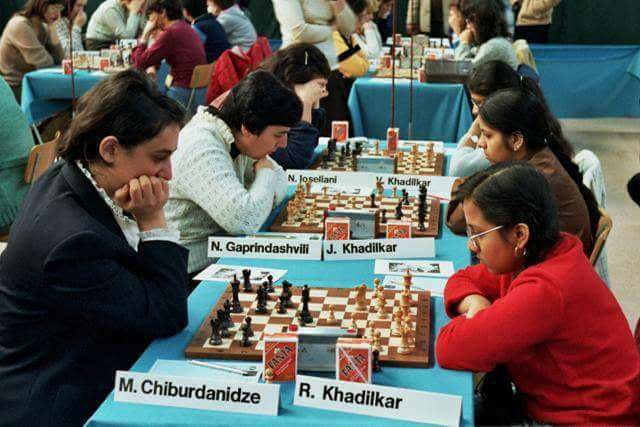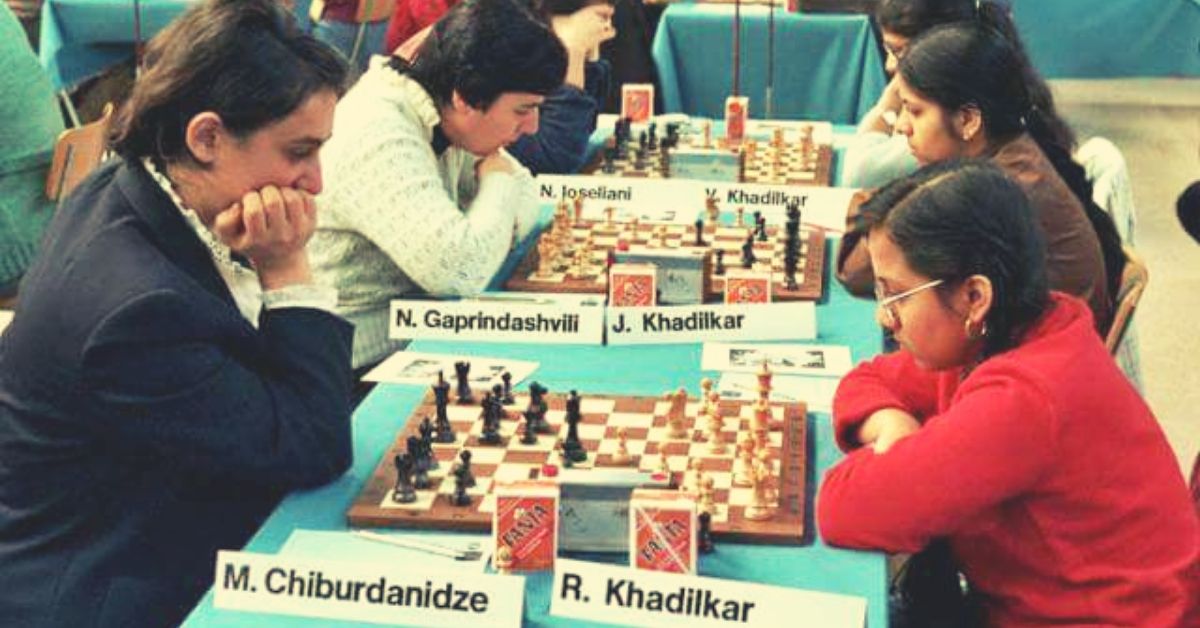From the time India held its first National Women’s Chess Championship in 1974 through to the early 1980s, the famous Khadilkar sisters—Jayshree, Vasanti and Rohini— from Mumbai, Maharashtra, dominated the scene.
Although it was Vasanti, the eldest, who won the inaugural tournament, for the next decade every title would go home with one of the Khadilkar sisters.
They started playing the game at a very young age. While Vasanti was just 10 years old, Jayshree was 9 and Rohini 8.

Born in April 1961, Vasanti would also go onto finish joint first with fellow Maharashtrian, Bhagyashree Sathe (Thipsay), in the British Ladies Championships, a competition which was once open to contestants from the Commonwealth nations.
Although she isn’t active on the professional scene today, Vasanti maintains a FIDE (Fédération Internationale des Échecs or World Chess Federation) rating of 2120. At her peak, in January 1990, she stood at 2135.
To the uninitiated, the FIDE rating system calculates the estimated strength of a player based on their performance against other contestants. India’s highest-rated women’s player currently is Koneru Humpy, who is at 2558.
Although Vasanti didn’t hit the heights of her sisters, she paved the way for them.
Jayshree, who is a year younger than her, is the four-time winner of the National Women’s Chess Championship and also has the honour of becoming the first Indian woman to earn the official FIDE-given title of Woman International Master in 1979.
Admittedly, she did not reach Vasanti’s ratings, but won more tournaments.
However, it is the youngest sister, Rohini, who set the world alight and remains the standout figure.
Born a year after Jayshree, on April 1, 1963, she won the National Women’s Championship five times and the Asian Women’s Championship twice.
Incredibly, she was a 13-year-old when she won her first National Women’s Championship in 1976. Besides knocking out other women who were much older than her, she also became the first woman to take part in the National Men’s Chess Championship in 1976.
Unsurprisingly, her participation in the men’s tournament caused much furore. The matter even went to the Bombay High Court.
However, her participation set in motion a series of events that eventually compelled then World Chess Federation president Max Euwe to pass a ruling stating that women cannot be barred from competing in any national and international tournament.
Also Read: Even the Referees Cried When We Won: Meet India’s Amazing Women’s Ice Hockey Team!
Rohini broke the gender barrier in India when it came to chess, becoming the first Indian woman to participate in a men’s tournament. She even went on to defeat a few state-level male champions in the tournament.
“When I started to do well against men, they did everything to discourage me,” Rohini once told The Hindu. “They would smoke in front of my face.”
However, her achievements were nothing short of historic. The Maharashtra government awarding her the Shiv Chhatrapati Award, the state’s highest honour in sports in 1977, and three years later in 1980, she won the Arjuna Award, the nation’s highest sports honour.
She was the first woman in chess to win the Arjuna Award. The highest FIDE rating she earned was 2220 in July 1987.
Currently inactive in the sport, her rating stands at 2215, which is higher than any of her sisters had achieved at their peak.
Following her retirement from the sport in 1993, she went onto break more glass ceilings, when she took over as editor of Sandhyakal and Navakal, two well-known Marathi dailies.
The success of three sisters isn’t really a surprise when you take into how their family backed them in the sport.
They had a legendary coach in Nasiruddin Ghalib who was a firm believer in the idea that female players would one day take over the sport because of their greater creativity and imagination.
Additionally, as a part of their daily routine, they would spend an hour playing against their father, while spending another three against the local competition.
In fact, such was the family’s desire to excel in sports that they skipped a year of formal schooling to focus on their chess, and were instead homeschooled. Well, their efforts did indeed pay off.
“Jayshree and Rohini achieved their IWM titles within a year of each other in a time when only 2 Indian male chess players had been able to achieve the same in a span of 20 years,” says this description in Chess Site.
There is no question the Khadilkar sisters leave behind a remarkable legacy for women chess players in India. Yes, other women chess players in India like Koneru Humpy, Harika Dronavalli, Divya Deshmukh and Tania Sachdev have gone onto earn greater adulation, grandmaster titles and world titles, but it’s the three sisters who showed fellow Indians that their women could indeed compete with the best in the world.
(Edited by Gayatri Mishra)
Like this story? Or have something to share? Write to us: contact@thebetterindia.com, or connect with us on Facebook and Twitter.
If you found our stories insightful, informative, or even just enjoyable, we invite you to consider making a voluntary payment to support the work we do at The Better India. Your contribution helps us continue producing quality content that educates, inspires, and drives positive change.
Choose one of the payment options below for your contribution-
By paying for the stories you value, you directly contribute to sustaining our efforts focused on making a difference in the world. Together, let's ensure that impactful stories continue to be told and shared, enriching lives and communities alike.
Thank you for your support. Here are some frequently asked questions you might find helpful to know why you are contributing?

